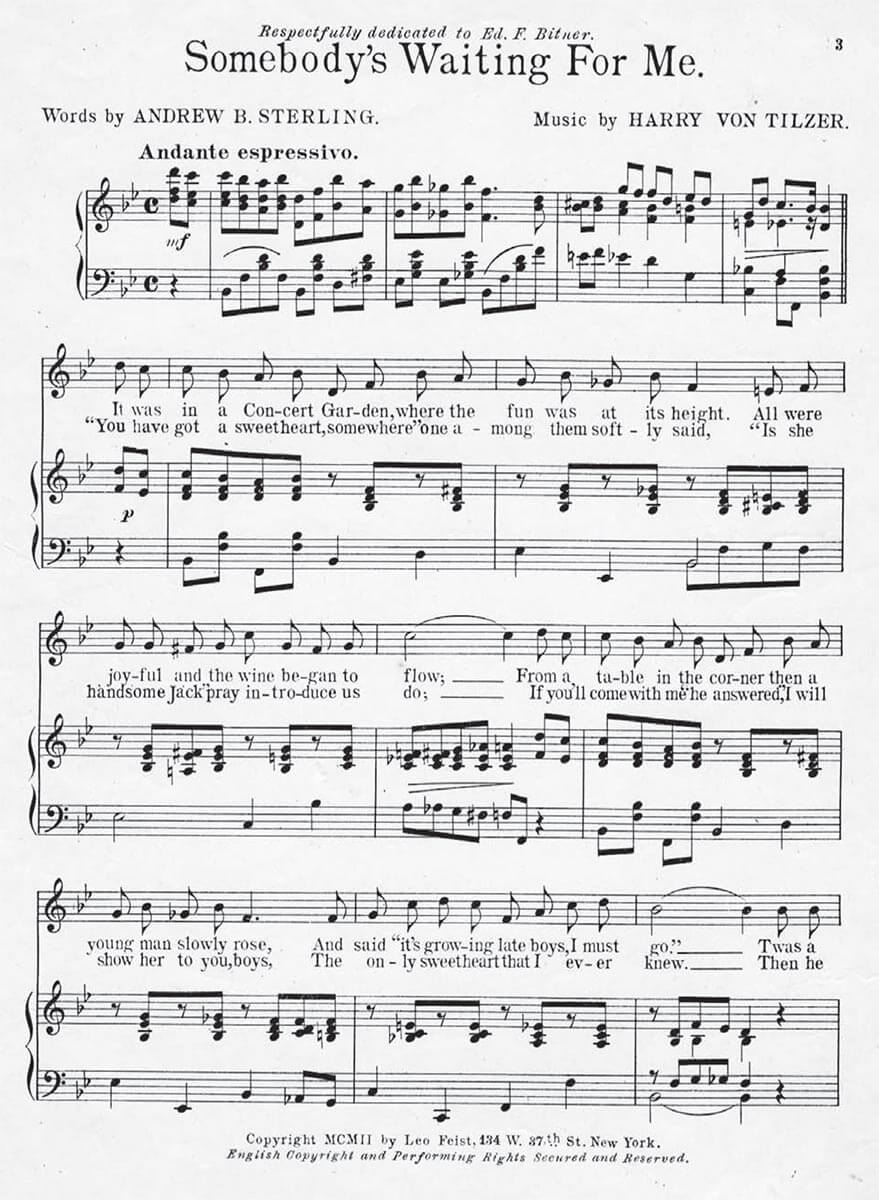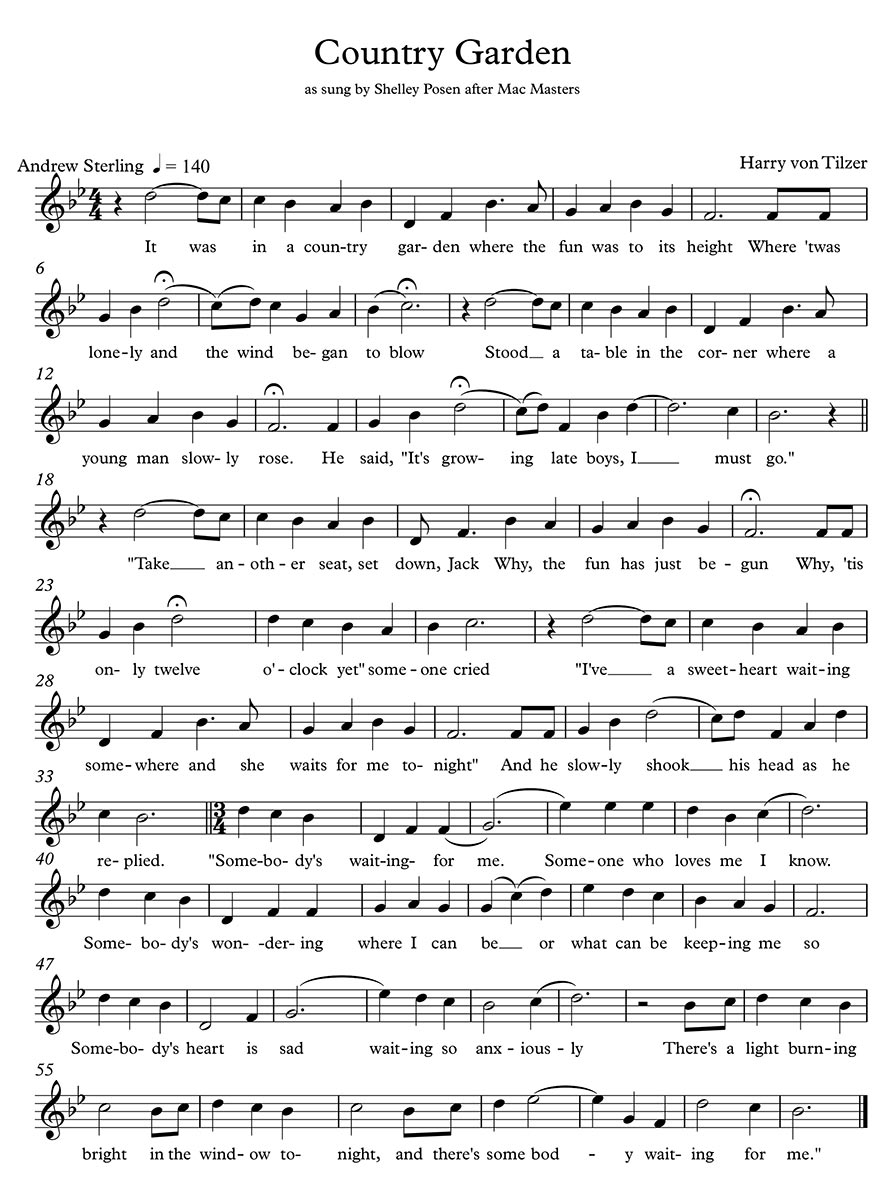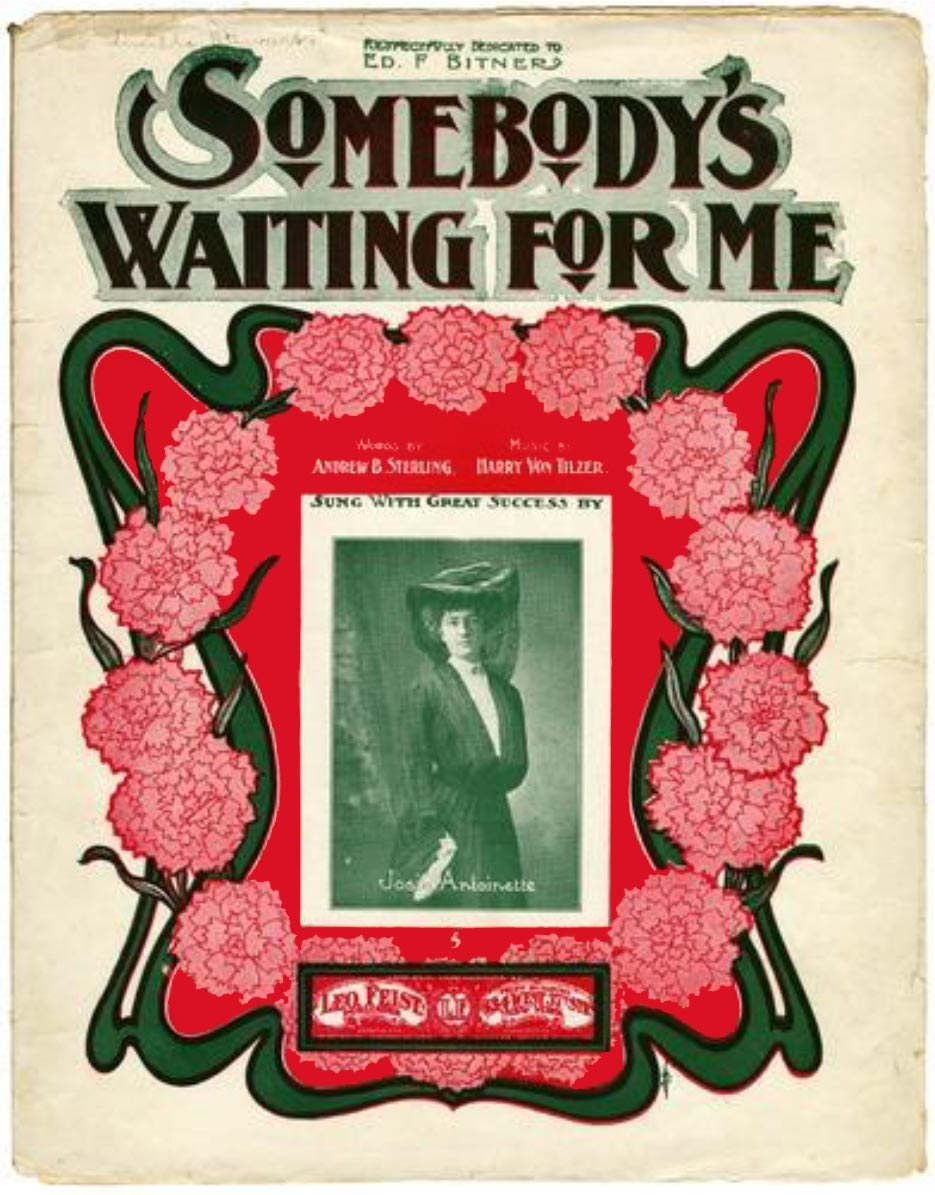Introduced by Shelley Posen
One of my all-time favourite traditional songs was originally titled, “Somebody’s Waiting for Me,” but the traditional singer who performed it best, as far as I am concerned, called it “Country Garden.”
That singer was Mac Masters, a Newfoundland sea captain I met in the early 1970s through my fellow Folklore graduate student, Wilf Wareham. Wilf’s father had been the merchant in Harbour Buffett, a fishing settlement on an island in Placentia Bay off the south coast of Newfoundland.
Old Mr. Wareham used to send Mac and his schooner around the bay every fall to pick up the salt fish made that summer. Wilf told me Mac was an especially welcome visitor in each outport, because evenings, after the fish had been loaded into the schooner’s hold, there’d be a “time” or party, and Mac would sing.
Mac must have been a splendid singer back then, because when I first heard him perform decades later, his strong, reedy voice still kept excellent pitch, and he beguiled the ear with a quirky sense of melody and changes of rhythm. His large repertoire was replete with late Victorian sentimental ditties such as “Country Garden.“
“Somebody’s Waiting for Me” was composed in 1902 by Andrew B. Sterling (words) and Harry von Tilzer (melody), two pioneers of Tin Pan Alley long before it was called that. The song’s first line set the narrative in a “concert garden”—a small beer garden or hall, usually attached to a tavern, where customers could drink and party while entertainers performed on a small stage. Concert gardens were American cousins of the Parisian café concert and the English music hall of the same era. They preceded vaudeville by a decade or two.
There’s only one recording I know of Mac performing this song, made by Wilf Wareham in the field. On the tape, Mac has a hard time putting the first verse together and finally just pushes through to the chorus, then nails the second verse and final chorus. He says he got the song from—well, the name sounds like “Martin Godden:” “We always got Martin to sing that, and he could sing it too, mister.”
The song lyric as Mac sings it differs in slight but interesting ways from the original, making it more, well, “Newfoundland.” In his version, as his title would indicate, “concert garden” is replaced by “country garden”—a concept he as a Newfoundlander would be more familiar with. And the second line’s “All were joyful and the wine began to flow” in Mac’s version becomes “Where ‘twas joyful and the wind began to blow.” Again, very Newfoundland. Whether Mac himself made these changes, and if so, on purpose or inadvertently, there’s no way of knowing.
The rest of the song’s story as Mac sings it is pretty much as written. But not the tune. Mac has an uncanny way of leaping and lingering as he makes his way through the song, shaping melody to lyric. Recorded versions of “Somebody’s Waiting For Me” by other performers (see Resources) present a workaday melody belonging to the time. Mac takes that melody and knocks it here, pulls it there, and pushes it somewhere else until it becomes quite new and altogether better. The song is already magically written in two time signatures: 4/4 for the verses, 3/4 for the chorus. Mac spins that gold into platinum. He also sublimes it into a melody that could never be accompanied by any instrument, except perhaps a solo fiddle playing the exact notes as he sang them. As with many traditional songs, this one is best performed alone.
I certainly can’t imagine “Country Garden” sung any other way. In fact, that’s the way I sing it myself now—or try to. The other day I was in a restaurant with a friend: I found myself telling her about Mac and the song, and I couldn’t resist quietly singing it to her across the table. She was moved to tears by the time I finished. It wasn’t me—it was Mac singing, through me, a grand old song.
[Thanks to the Memorial University Folklore and Language Archives (MUNFLA) for a copy of the recording 70-008_C775 from the collection of Wilf Wareham, Arnold’s Cove, 10.6.70.]
Listen to Shelley sing “Country Garden:”


Lyrics: Country Garden as sung by Mac Masters
It was in a country garden when the fun was to its height
Where ‘twas joyful and the wind begin to blow
Stood a table in the corner where a young man slowly [said]
He said, “It’s growing late, boys, I must go.”
“Take another seat, set down, Jack, why the fun has just commenced!”
“Why, it’s only twelve o’clock yet!” someone cried … *
[Lines forgotten, replaced with:]
He said, “It’s growing late, boys, I must go.”
“Somebody’s waiting for me, someone who loves me I know
“Somebody’s wondering where I can be or what can be keeping me so
“Somebody’s heart is sad waiting so anxiously
“There’s a light shining bright in the window tonight
“For there’s somebody waiting for me.”
“I have got a sweetheart somewhere,” one among them softly said
“If she’s handsome Jack, please introduce us, too”
“If you’ll come ’long with me, I will show her to you, boys
“She’s the only sweetheart that I ever knew.”
He took us to a cottage, pointing through a windowpane
Where an old grey-headed woman sat with bowed down head
“She’s my mother and my sweetheart, she’s the one I meant tonight
“So you see I told the truth, boys, when I said:
“Someone is waiting for me, someone who loves me I know
“Someone is wondering where I can be or what can be keeping me so
“Somebody’s heart is sad waiting so anxiously
“There’s a light shining bright in the window tonight
“For there’s somebody waiting for me.”
* Two last lines for this verse should be:
“I’ve a sweetheart waiting somewhere, and she waits for me tonight
And he slowly shook his head as he replied:”
Resources
“Somebody’s Waiting for Me” is Roud #15784. Other titles: “The Concert Garden,” “My Only Sweetheart.” There is one Newfoundland entry, but it is not Mac Masters’s “Country Garden.”
Recordings (other singers):
Shelley Posen is a retired folklorist and songwriter living in Ottawa, Canada. Formerly Curator of Canadian Folklife at the Canadian Museum of History, his Ph.D. dissertation was based on research he conducted into singing in the Irish-French Ottawa Valley community of Chapeau, Quebec. Shelley has sung at folk festivals, in clubs and kitchens, and on concert stages in the U.S. and Canada. He was a member of the close harmony folk trio, Finest Kind, who toured North America and the U.K. for two and a half decades and recorded some 7 CDs. Shelley has recorded 4 CDs of his own.


 Thanks to the Massachusetts Cultural Council for their generous support.
Thanks to the Massachusetts Cultural Council for their generous support.
 Isaac Banner
Isaac Banner Seth Tepfer
Seth Tepfer Christa Torrens
Christa Torrens Ellie Shogren
Ellie Shogren Sharon Green
Sharon Green Dilip Sequeira
Dilip Sequeira